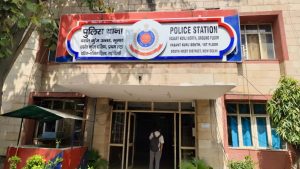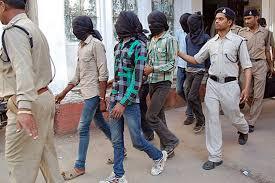New Delhi – A disturbing case has come to light involving British Tourist Raped In Delhi Hotel in Delhi’s Mahipalpur area. The victim, a 36-year-old woman from the UK, had traveled to India in March to meet a man she had been conversing with online for over two months. The police have filed a chargesheet in the matter, and investigations revealed that the accused, Kailash, also worked as a labourer in a local glass shop.
Online Friendship Turns Tragic
The incident began in January when the British national connected with the accused through the social media platform Instagram Threads. The two exchanged friendly messages for months, despite a language barrier, as the man used Google Translate to communicate with her. Their interactions were consistent, and a bond of friendship was formed. Trusting their connection, the woman decided to travel to India to meet him in person.
She arrived in the country on March 7, first visiting Goa where she stayed until March 11. The accused, Kailash, was invited to Goa by the woman, but he reportedly couldn’t make the trip. Undeterred, the woman made plans to travel to Delhi and booked a hotel room in Mahipalpur where they could meet. What she believed would be a friendly in-person meeting soon took a dark turn.
British Tourist Raped In Delhi Hotel After Alcohol Consumption

On March 12, at the hotel in Mahipalpur, the accused allegedly raped the British woman. The woman informed police that they consumed alcohol during their meeting, but the encounter turned forceful, leaving her shaken and traumatized. According to the police, the accused later admitted that the incident occurred under the influence of alcohol, though this does not excuse the crime in any manner.
This case of a British Tourist Raped In Delhi Hotel has highlighted significant concerns regarding the safety of foreign visitors, particularly women, traveling alone in India. It also raises questions about the dangers of online interactions that progress to offline meetings.
Also Read: Digital Arrest Scam In Delhi: Retired Employee Loses Rs. 14 Lakh
Charges Filed in Patiala House Court


The Delhi Police took swift action following the complaint. The accused, Kailash, was arrested after the victim reported the crime. He was identified as a resident of Harijan Basti in the Vasundhara Enclave area of Delhi. Employed as a labourer at a glass shop in Mahipalpur, Kailash had no prior criminal history, as per the preliminary findings.
A chargesheet in the British Tourist Raped In Delhi Hotel case was filed by the police on May 22. It was submitted to the court of Aniket Singh at Patiala House Court. The contents of the chargesheet reportedly include details of their social media communication, testimonies from the victim, the accused’s admission, and forensic findings that support the prosecution’s case.
Shocking Role of Housekeeping Staff
As the investigation deepened, the victim disclosed another alarming incident during her hotel stay. She alleged that a hotel housekeeping staff member had touched her inappropriately. Based on her statement, the police identified the staff member as Gulfaam and arrested him shortly afterward.
This second arrest in the British Tourist Raped In Delhi Hotel case further emphasizes the vulnerabilities faced by solo travelers, especially women, when staying in unfamiliar places. The involvement of a hotel employee in such an incident also points to potential lapses in the hotel’s hiring and background verification processes.
Communication Records and Police Findings


Police officials reviewed chat records exchanged between the woman and Kailash. Their communication reflected a friendly tone, with conversations stretching over a period of two months. Investigators noted that Kailash had no known criminal background and lived a relatively modest life as a labourer. He had never traveled abroad and had minimal understanding of cultural sensitivities.
Despite the friendly nature of their chats, the British Tourist Raped In Delhi Hotel case demonstrates how online interactions can quickly escalate into dangerous real-world encounters when there is an imbalance of trust and expectations.
Tourist’s Statement and Police Response
According to a senior officer handling the case, the woman said she had booked the Mahipalpur hotel room herself and had not expected the meeting to turn violent. “She thought it was going to be a friendly meeting. Instead, she was raped and later touched inappropriately by a hotel employee,” the officer stated.


Delhi Police maintained transparency in handling the case. They ensured prompt medical evaluation of the victim and documented her statement thoroughly. Legal representation was arranged, and counseling services were also extended to the tourist. The speed with which the chargesheet was filed shows that the police prioritized the case and treated it with the seriousness it deserved.
Broader Implications on Tourist Safety
The British Tourist Raped In Delhi Hotel incident has reignited debates about the safety of international visitors in India. While the country continues to attract millions of foreign tourists annually, instances like this damage its reputation and raise alarm bells for travel safety standards. Calls for better hotel security, staff verification, and social media education are now being echoed by several advocacy groups.
Many are urging foreign tourists to be extremely cautious when planning to meet individuals they know only through social media. After the incident of British Tourist Raped In Delhi Hotel, the Delhi Police has advised tourists to stay connected with embassies, use verified accommodation services, and avoid isolated meetings with unknown individuals.
Concluding Remarks
The case of the British Tourist Raped In Delhi Hotel is a grim reminder of the risks associated with blind trust and inadequate safety measures. Despite friendly online exchanges, the real-world outcome was traumatic for the visitor. The swift arrests of both the accused and the hotel staff reflect the seriousness with which the authorities treated the matter.
As the legal process unfolds in the Patiala House Court, the incident of British Tourist Raped In Delhi Hotel is likely to prompt discussions about revisiting tourism safety protocols and strengthening regulations for hotels and online interactions.

